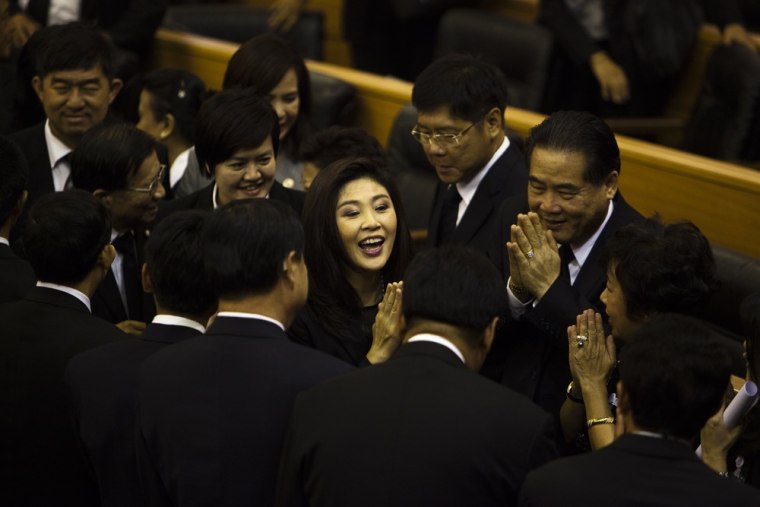Yingluck Shinawatra was elected Thailand's first female prime minister on Friday in a parliamentary vote just 11 weeks into a political career crafted from exile by her brother and former premier, Thaksin Shinawatra.
The 44-year-old former businesswoman, who was unopposed, sailed through the vote in the 500-member parliament to take charge of a country plagued by instability since Thaksin was ousted by the army in 2006.
She quickly won the approval of more than 251 lawmakers. The vote continued.
Yingluck must wait for the endorsement of King Bhumibol Adulyadej, which could come as early as Friday evening, before she officially takes up her post and begins naming a cabinet. Candidates for cabinet jobs have been kept under wraps by her Puea Thai Party.
Yingluck was propelled from relative obscurity to stardom in a matter of days after entering the election race on May 16 as the campaign leader of Puea Thai, a party effectively controlled by twice-elected billionaire Thaksin, who lives in Dubai to evade a two-year jail sentence for corruption.
The decision to field Yingluck was regarded — even by some of his enemies — as a masterstroke by Thaksin to wrest back power and ensure the support of millions of poor voters loyal to him because of his populist policies during five years in power.
To the surprise of analysts, who had expected a closer general election, Puea Thai won an outright majority of 265 of the 500 seats in parliament, leaving the Democrats of outgoing Prime Minister Abhisit Vejjajiva a distant second with 159.
Yingluck will lead a coalition of six parties with a total 300 seats. The partners will get some cabinet posts but she is also expected to appoint some ministers from outside parliament.
The Securities and Exchange Commission, a financial market watchdog, has announced the resignation of its secretary-general, Thirachai Phuvanatnaranubala, who has been named in media reports as a potential finance minister.
But Thailand's people remain split, and Yingluck will face the immediate challenge of keeping the country clear of the sometimes violent unrest it has witnessed since the army toppled her now-exiled brother, Thaksin Shinawatra.
To do so, she must navigate complex political terrain and find a delicate equilibrium between the coup-prone army and the elite establishment on one side, and the so-called Red Shirt movement on the other. The Red Shirts helped vote her into office and want to see justice meted out for the bloody military crackdown that ended its protests in Bangkok last year.
The party Yingluck heads is the latest incarnation of Thaksin's original Thai Rak Thai party, which swept elections twice before Thaksin was overthrown. Two pro-Thaksin prime ministers who followed were removed after hostile judicial rulings and parliamentary maneuvering that came as enraged "Yellow Shirt" demonstrators took to the streets, at one point shutting down both of Bangkok's international airports and stranding hundreds of thousands of travelers.
The Red Shirts have fought back, most recently by flooding downtown Bangkok in 2010 for two months in demonstrations that ended with more than 90 people dead and nearly 2,000 wounded — almost all of them protesters.
Short honeymoon
Yingluck now faces the daunting task of reconciling the nation. She must also prove she is not her brother's puppet, as critics claim, and deal with the controversial issue of his possible return from self-imposed exile.
The honeymoon will quickly be over. Pressure is expected to build on her to implement populist policies that critics say could ramp up government debt and inflation and put companies out of business.
In particular, she has promised a jump in the minimum wage of up to 90 percent and a guaranteed farmgate price for rice that is nearly double the market level before the election.
Usara Wilaipich, a Bangkok-based economist with Standard Chartered Bank, said it was almost certain the new government would press ahead with its policies and much would depend on exactly how they were introduced.
"Too much attention is on the populist policies because of the worries about inflation, but their impact depends on how they are implemented and along what kind of timeline," she said.
"Everyone is waiting to find out what the final economic agenda is and how these policies will be handled," she added, while noting the global economic environment would also be crucial.
One of the biggest political problems facing Yingluck is her brother's influence. She has found it difficult to convince the public of her independence from Thaksin, a former telecoms tycoon reviled by Thailand's "old money" elite but revered as a hero by millions of poor in the cities and countryside.
Analysts say it is unlikely Thaksin's opponents or their allies in the military will try to sideline Yingluck soon as Puea Thai has a huge mandate, but Thailand's medium-term outlook remains fragile because of political and social polarization.
